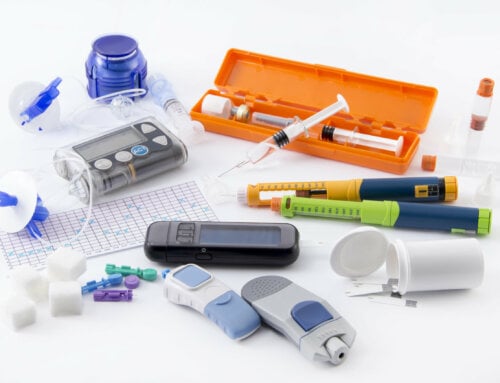Many people with diabetes experience low blood sugar levels at night. Recent studies revealed it is more common than most experts thought for people with diabetes to experience hypoglycemia while they sleep. Discover 3 reasons for nighttime hypoglycemia and what you can do about them.
- When people experience hypoglycemia, their blood sugar levels get too low. Symptoms usually occur when your blood sugar goes below 70 mg/dl. These symptoms may include headaches, perspiring, dizziness, irritability, anxiety, hunger, nightmares, rapid heartbeat, feeling restless or acting erratic. Some people do not get symptoms, which is called “hypoglycemia unawareness”. You may experience heavy perspiration during the night with wet morning bed sheets and not know the cause. You may also have high morning blood sugars due to a “rebound effect”. It can be dangerous as you are less likely to wake up or realize your blood sugar is low. This often happens when there is long standing diabetes. It is important to check your blood sugar level before you go to bed to see if it is too low. Always have a healthy snack of a protein and carbohydrate 30 minutes before you settle in for the night. You should also check it in the morning to see if the levels are low. Make sure to have a healthy breakfast each day.
- When you sleep, your liver may pump out a lower amount of glucose. The pancreas may not respond to this reduced glucose production when you have diabetes. As a result, the same amount of insulin is secreted and you can experience nighttime hypoglycemia. It can be a challenge to maintain the proper balance. Discuss medications including your insulin dosage with your doctor to make sure you are administering the right amount at the right times. Always talk to your doctor before changing your dosage and do not self prescribe your insulin. Too much long acting insulin may cause nighttime hypoglycemia. Sulfonylureas may also contribute to night time lows. Medicines including Glyburide, Glipizide and Glimepiride are sulfonylureas.
- Skipping dinner is a reason for low blood sugar at night. Eat a well-balanced dinner each night that includes whole grains, vegetables or fruit, lean meat or fish and low-fat dairy. Be aware of the proper portion sizes when you eat dinner.
- Avoid having alcohol before going to bed since it may increase the risk of hypoglycemia when you are sleeping. Alcohol may lower the amount of glucose produced by the liver which can increase hypoglycemia. Women should limit alcohol intake to one drink daily and men should have no more than two. One drink is 5 ounces of wine, 12 ounces of beer or 1 ½ ounces of spirits, such as gin or vodka. It is best to have a drink with food to reduce the risk of developing nighttime hypoglycemia.
- People with diabetes need to exercise for at least a half hour each day, but this should not be done late at night before you go to bed. Rigorous exercise before you go to bed can make your blood sugar drop during the night. Avoid exercising at least two hours before heading to bed.
- If you know you have symptoms of nighttime hypoglycemia, be prepared. Keep glucose tablets, liquid or gel by your bed so you can take care of yourself right away without having to get out of bed. Dextrose sugar is absorbed the quickest and is in these products. Make sure they are unwrapped and easy to access when you have hypoglycemia. If you are feeling dizzy or lightheaded, it could be risky to get up and walk around. Having something to help you get past that moment helps ensure your safety. Keep a phone near the bedside if you need immediate medical assistance.
- If your blood sugar plummets regularly at night talk to your health care provider about changing your diabetes self-management plan. You doctor might recommend testing your blood sugar around 2:00 A.M. for a few nights to see whether you have low blood sugar. A continuous glucose monitoring device (CGM) can also be used to check your levels if your blood sugar gets too low or too high. Nighttime hypoglycemia can have a negative impact on your ability to get proper sleep. This can lead to sleep deprivation and other related health issues, including heart problems and weight gain.
Nighttime hypoglycemia occurs more often than most people think. Test your blood sugar, eat regular meals and snacks and avoid alcohol or exercise before bed. Discuss ongoing low blood sugar levels with your doctor to make the necessary changes for a good night’s sleep.







Leave A Comment